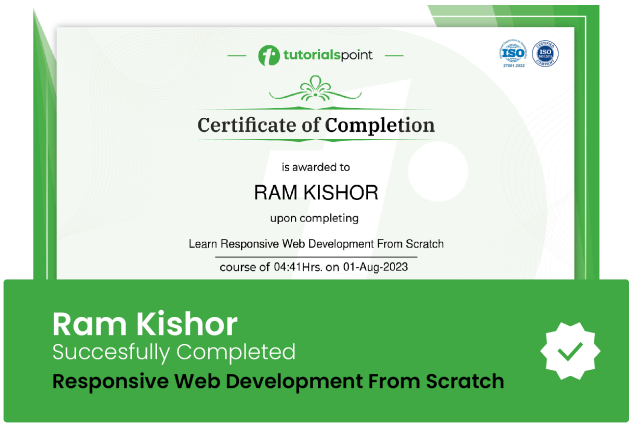Financial Statements 101: A Question-and-Answer Guide
The Essential Guide to Understanding Financial Statements

Lectures -18
Duration -2.5 hours

30-days Money-Back Guarantee
Get your team access to 10000+ top Tutorials Point courses anytime, anywhere.
Course Description
Financial Statements 101: A Question-and-Answer Guide is an online course designed to provide bankers, finance executives, students, entrepreneurs, and anyone looking to gain a better understanding of finance and accounting with a comprehensive and easy-to-understand guide to financial statements.
The course is structured in a unique Question-and-Answer format, with a total of 101 questions (covered in 18 videos) focused on items commonly seen in financial statements. These questions are grouped based on common topics, making it easier for students to understand and retain the information. Each question is accompanied by a video, providing a visual representation of the answer, making the course even more accessible and engaging.
The questions in the course are designed to cover various aspects of financial statements. This comprehensive approach means that students will leave the course with a deep understanding of financial statements and the ability to analyze and interpret them with confidence.
The course is designed to be easy to understand, making it accessible to students of all levels of financial and accounting knowledge. Whether you are a beginner looking to gain a basic understanding of financial statements or an entrepreneur looking to improve your financial literacy, this course has something to offer you.
So, if you're looking to take the first step toward mastering financial statements, then this course is for you.
If you are curious to know those 101 Questions, here it is! (Of course, answers inside the course)
What are Financial Statements?
Who is responsible for preparing Financial Statements?
What are the responsibilities of the management in relation to making estimates in the preparation of financial statements?
What are Indian Accounting Standards (IND AS) and to whom are they applicable?
What is Annual Report?
What are Standalone Financial Statements?
What are Consolidated Financial Statements?
What are Interim Financial Statements?
What is Accounting Policy?
What are Significant Accounting Policies?
What will be the impact of Changes in Accounting Policy on Financial Statements?
What is Accounting Estimate?
What is Balance Sheet?
What are Assets?
What are Non-Current Assets?
What are Current Assets?
What are Property, Plant, and Equipment?
What is Depreciation?
What is Accumulated Depreciation?
What is the Straight Line Method of Depreciation?
What is the Written Down Value Method of Depreciation?
What is Accumulated Depreciation?
What is the estimated Useful Life of an Asset?
What is the Book Value of an Asset?
What is Freehold land?
What is Interest during the construction period?
What is Impairment?
What is the Reversal of Impairment Loss?
What is the De-recognition of Assets in Financial Statements?
What is Capital Work in Progress?
What is the Ageing of Capital Work in Progress?
What is Right-of-Use Asset?
What is Finance Lease?
What is Operating Lease?
What are Current Lease Receivables & Non-Current Lease Receivables?
What is Finance Lease Receivables?
What are Intangible Assets?
What are Internally generated intangible assets?
What are Investments in Subsidiaries?
What are Investments in Joint Ventures?
What are Investments in Associates?
What are Non-Current Investments?
What are Current Investments?
What are Loans and Advances - Non-Current?
What are Loans and Advances - Current?
What are Current Financial Assets?
What are Non-Current Financial Assets?
What are Derivative Financial Instruments?
What are Restricted Deposits?
What are Government Incentives Receivable?
What are Capital Advances?
What Are Taxes Recoverable?
What is Advance Tax?
What are Prepaid Expenses?
What are Inventories?
What are Raw materials and components?
What is a Work-in-progress?
What are Finished goods?
What are Stores and spare parts?
What are Trade Receivables?
What are Credit impaired receivables?
What are Cash and cash equivalents?
What is Equity Share Capital?
What is Authorised Share Capital?
What are Ordinary Shares?
What is Issued, Subscribed, and Called Up Share Capital?
What are the different types of Reserves?
What are Retained Earnings?
What are Long-Term Borrowings?
What is Term Loan?
What are Debentures? What are the different types of debentures?
What are Inter-Corporate Deposits?
What are Short-Term Borrowings?
What are Trade Payables?
What is Liability towards Employee Separate Scheme?
What are Current Financial Liabilities?
What is Interest accrued but not due on borrowings?
What is Liability towards Investors Education and Protection Fund?
What are Provisions?
What are Current Provisions and Non-Current Provisions?
What is Income Tax Expense?
What is Deferred Tax?
What is Deferred Tax Liabilities?
What are Deferred Tax Assets?
What are Related Party Transactions and how it will impact Financial Statements?
What are Contingent Liabilities?
What are Contingent Assets?
What is Revenue from Operations?
What is Other Income?
What is the Cost of Materials Consumed?
What are Changes in Inventories of Finished Goods?
What are Changes in Inventories of Working in Progress?
What is Employee Benefit Expense?
What are Finance Costs?
What is Other Comprehensive Income?
What is Earnings Per Share?
What are Notes on Accounts?
What is Audit Report?
How to read Audit Report?
What is UDIN and how it can help stakeholders like lenders?
What is CARO?
Who this course is for:
- Bank Executives
- Finance Executives
- Finance Professionals
- Entrepreneurs
- Students
Goals
What will you learn in this course:
You can expect to achieve better understanding on the following after completing tjhis course.
- Types of Financial Statements
- Balance Sheet and its components
- Assets
- Liabilities
- Equity
- Income Statement
- Taxes
Prerequisites
What are the prerequisites for this course?
- No Prior skill required

Curriculum
Check out the detailed breakdown of what’s inside the course
Introduction and Basic Q&A
3 Lectures
-
Introduction 05:02 05:02
-
Types of Financial Statements 02:35 02:35
-
Accounting Policy and Estimates 06:25 06:25
Balance Sheet (Assets) related Q&A
9 Lectures

Balance Sheet (Equity & LIabilities) related Q&A
4 Lectures

Income Statement related Q&A
1 Lectures

Notes on Accounts and Audit matters related Q&A
1 Lectures

Instructor Details

CA Raja Classes
Passionate Chartered Accountant and Educator, bringing finance to lifeI am a Chartered Accountant with tonnes of passion for teaching.
I teach Financial Management & Strategic Financial Management for Chartered Accountancy, Cost and Management Accountancy and Company Secretary students in Ernakulam, India. I also hold Post Graduate Diploma in Business Administration in Finance from Symbiosis, Pune and Bachelors in Commerce, from Loyola College, Chennai.
I worked in State Bank of India as Assistant Vice President - Credit for a period of four years after which i started my Chartered Accountancy Practice. During the stint in State Bank of India, I worked on credit proposals of Mid Corporate Units and gained good experience in Financial Analysis, Risk Assessment, Viability Study, Evaluating business models, Project Finance, Working Capital Management, etc.
I conduct work shops for Entrepreneurs, Chartered Accountancy / Cost and Management Accountancy Students on the topics like Project Finance, Credit Risk Assessment, Entrepreneurship Development, Finance for Non Finance Executives, etc.
I love teaching and i want fundamentals of accounting and finance to reach students and so i am here.
Course Certificate
Use your certificate to make a career change or to advance in your current career.

Our students work
with the Best


































Related Video Courses
View MoreAnnual Membership
Become a valued member of Tutorials Point and enjoy unlimited access to our vast library of top-rated Video Courses
Subscribe now
Online Certifications
Master prominent technologies at full length and become a valued certified professional.
Explore Now


 Updated on Apr, 2024
Updated on Apr, 2024
 Language - English
Language - English